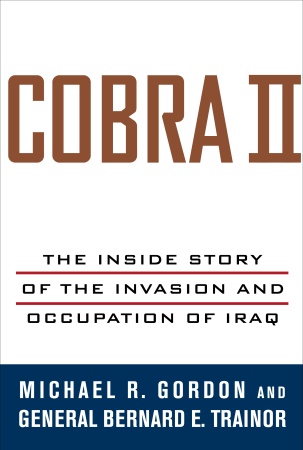Like a Clueless Software Boss
 When I face lengthy airplane rides, I try to bring a variety of books. In addition to mindless entertainment reads, I bring at least one serious piece of literature along with one substantial nonfiction text. I find that a massive nonfiction tome with footnotes, endnotes, appendices, forewards, and afterwords gives me something to really dive into and forget about being 35,000 feet above solid ground for a few hours. One this trip I took last week, I read Cobra II: The Inside Story of the Invasion and Occupation of Iraq.
When I face lengthy airplane rides, I try to bring a variety of books. In addition to mindless entertainment reads, I bring at least one serious piece of literature along with one substantial nonfiction text. I find that a massive nonfiction tome with footnotes, endnotes, appendices, forewards, and afterwords gives me something to really dive into and forget about being 35,000 feet above solid ground for a few hours. One this trip I took last week, I read Cobra II: The Inside Story of the Invasion and Occupation of Iraq.
It’s an exhaustively researched book that has garnered a number of positive reviews. And the New York Times currently ranks it at number 6 on the Hardcover Nonfiction best seller list. While I admit I got a little bogged down in the exhaustive accounts of various battles throughout the invasion of Iraq, I also realize that military history buffs love this kind of thing. I have a couple of coworkers who debate left flanks and pincher moves all day and this book is perfect for them.
I was most engrossed by the first half of the book. This section details how the Bush administration went through the various stages of planning the invasion of Iraq. And although I realize the stakes are much, much, much (ad infinitum) higher, I couldn’t help relating the Pentagon’s planning experiences to my own life in the software field.
In our business, customers inevitably want a computer system to cure cancer, wash their dishes, and make time travel possible. And also inevitably, there is a boss involved who reads a lot of CEO biographies, likes to think of himself as “demanding,” and who considers himself an expert on some emerging technology because he read a 150 word article in this month’s in-flight magazine while he reclined his first-class seat. He’s convinced he knows more than the experts, that he can get “the best” out of his people, and whatever time and cost estimates are provided–he wants you to cut them by 75%.
According to the authors of Cobra II, that’s Don Rumsfeld.
I don’t normally talk about politics on Slushpile.net. It gets ugly in today’s climate and there’s always that one person who thinks Strom Thurmond wasn’t conservative enough. They argue he was really a pinko pansy hippie in spite of how most people perceive him. Conversely, there’s always that one person who thinks Lyndon Larouche or the SLA weren’t liberal enough. They argue that Larouche is a crackpot who has no business even being mentioned in the Democratic elections because he’s really a Republican in disguise.
And undoubtedly someone is going to bitch about my tongue-in-cheek choices above. That’s why I generally constrain my political discussions to friends gathered around my library, sipping brandy, and smoking fine cigars. I will say that as a rule, I am quite neutral in my own political ideals simply because I generally hate all of them. So before reading this book, I wasn’t pro-Rummie, nor anti-Rummie.
But with Cobra II, I just couldn’t help but be stunned at how Rumsfeld is portrayed as that software customer who thinks they know how to do everything. In the very first scene, three-star general Greg Newbold outlined Central Command’s OPLAN 1003-98, the contingency plan developed in case of war with Iraq. “As Newbold outlined the plan, which called for as many as 500,000 troops, it was clear that Rumsfeld was growing increasingly irritated,” the authors write. “…The defense secretary said in exasperation that he did not see why more than 125,000 troups would be required and even that was probably too many.”
There are too many examples in the text to recount here. Plus, I forgot to bring a highlighter or any other way to mark the book on my flight so I can’t easily flip back to negative Rumsfeld portrayals except to open just about any page. He’s shown to be a controlling, manipulative, possessive, arrogant, and condescending manager. He’s portrayed as a penny-pincher, except for when it suits his purposes, such as when Rumsfeld’s aides pressed CENTCOM to drop the Massive Ordnance Air Blast Bomb. The MOAB is a 21,7000 monster that had to be dropped from a vulernable and slow-moving C-130 and “seemed singularly inappropriate for an air command that was committed to precision warfare and limiting collateral damage in Iraq.” In this instance, Rumsfeld’s group of civilians didn’t get their wishes, but throughout the rest of Cobra II it’s clear that the men in suits ignored the advice of the men in uniform.
Since warfare began, budgets have been needed. Time estimates, troop ramp-up time, troop offloading time, supplies, and money have always been considered. And maybe this kind of bean-counter interference has always happened and we just didn’t know about it. Hell, maybe Napoleon would have made it to Europe if his damned accountants didn’t shortchange him on oats for the horses. So maybe this isn’t anything new in military history. But certainly, a civilian population hasn’t had an inside peek like this.
This book can occasionally be a chore if you’re not a military buff. The details, facts, and sources are so exhaustive that you can get bogged down in the minutae. However, stick with it. The writers didn’t set out to produce an entertaining page turner but rather and informative illustration for how the military planning happened. And it’s an eye-opener.
